|
|
|
Sort Order |
|
|
|
Items / Page
|
|
|
|
|
|
|
| Srl | Item |
| 1 |
ID:
120357
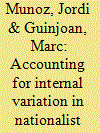

|
|
|
|
|
| Publication |
2013.
|
| Summary/Abstract |
Between September 2009 and April 2011, around one-half of the Catalan municipalities held unofficial referendums on independence from Spain, in which more than 800,000 citizens took part. However, the participation rates were unevenly distributed across Catalonia. In this paper, using an original data set, we aim to respond to two relevant questions: first, why in some municipalities the referendum took place and in others it did not occur. Second, why did the referendum achieve high rates of turnout in some localities and much lower participation in others. We find that the resources available to the movement, the intensity of the mobilization efforts, the participatory tradition of the municipalities and the size of the nationalist 'sentiment pool' in each locality explain to a great extent the internal variation in nationalist mobilization in Catalonia.
|
|
|
|
|
|
|
|
|
|
|
|
|
|
|
|
| 2 |
ID:
158178
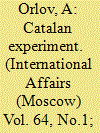

|
|
|
|
|
| Summary/Abstract |
On October 1, the regional powers - the government and the Parliament of Catalonia - carried out a referendum on independence from Spain. The Spanish government (that had gone to all lengths to prevent it) declared its results null and void. Prime Minister of Spain Mariano Rajoy dismissed it as a "democratically deplorable spectacle.
|
|
|
|
|
|
|
|
|
|
|
|
|
|
|
|
| 3 |
ID:
152597
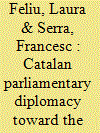

|
|
|
|
|
| Summary/Abstract |
This essay analyzes the diplomacy of the Parliament of Catalonia in the Autonomous Community of Catalonia, Spain, toward the Mediterranean region. In recent years, the academic literature has shown increased interest in the wide range of international activities undertaken by members of parliaments at the subnational level. Yet the academic study on diplomacy of the Parliament of Catalonia remains limited. Because there is a well-rooted tradition of foreign activity in the Catalan political culture, the Parliament of Catalonia has been working consistently in the international sphere. The Mediterranean dimension illustrates the strengths and the weaknesses of such activities.
|
|
|
|
|
|
|
|
|
|
|
|
|
|
|
|
| 4 |
ID:
156298
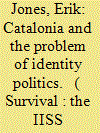

|
|
|
|
|
| Summary/Abstract |
The 1 October Catalan referendum on independence was a trap for Madrid. Spain’s political leaders were bound to be criticised whether they ignored the vote or tried to stop it. Shunting responsibility for dealing with the crisis onto the courts and the police was no way out. The voters in Catalonia know that. Now the Spanish government will be held to account. Political leaders everywhere should pay attention.
|
|
|
|
|
|
|
|
|
|
|
|
|
|
|
|
| 5 |
ID:
095081


|
|
|
|
|
| Publication |
2010.
|
| Summary/Abstract |
The 1978 Spanish Constitution enshrined the recognition of linguistic, cultural, and some degree of 'national' pluralism in the country and outlined procedural mechanisms for the creation of regional 'autonomies', which has given rise to a de facto asymmetrical federal state. This article begins by analyzing the compromise over issues of national identity embedded in the Constitution and the process by which this was forged. It highlights the articulation among political forces of contending conceptions of national identity and different projects for reorganising the territorial structure within and/or against the Spanish state. It also describes the social bases of support for the respective projects. Next, the article examines recent challenges to the parameters of the constitutional compromise. It shows that citizens' support for the basic parameters of the 1978 compromise remains high and has even become stronger. It emphasises that the preferences of the general public stand in sharp contrast with the preferences of influential sections of the Basque and Catalan regional political establishment, and it concludes that current challenges to the constitutional compromise are driven by political elites.
|
|
|
|
|
|
|
|
|
|
|
|
|
|
|
|
| 6 |
ID:
138883
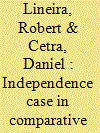

|
|
|
|
|
| Summary/Abstract |
Scotland is not the only sub-state unit in Europe where relevant political actors make claims for independence. To generate insights on these independence demands, we compare the drivers, arguments and popular support for secession in Scotland, the Basque Country, Catalonia and Flanders. We argue that national identity, party politics and the economy are behind the independence requests, and the exact articulation of these elements varies from case to case. Currently, the most salient of these demands are the ones from Catalonia; Basque demands for self-determination are less prominent than in the past, whereas the demand for a vote on independence is much less articulated in Flanders. Although the Scottish independence referendum has set a precedent for solving independence disputes, we argue that the possibilities of exporting the Scottish referendum experience to other realities are limited.
|
|
|
|
|
|
|
|
|
|
|
|
|
|
|
|
| 7 |
ID:
157442


|
|
|
| 8 |
ID:
095092
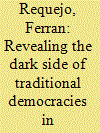

|
|
|
|
|
| Publication |
2010.
|
| Summary/Abstract |
In this article, I will deal with some elements related to the analysis of theories of democracies and federalism in plurinational contexts. The paper highlights some flaws and shortcomings of traditional liberal democracies in these contexts and the challenge of establishing effective practices of a politics of recognition and constitutional accommodation of internal national pluralism (Section 1). Secondly, the paper analyses the case of Catalonia after the recent reform of its Statute of Autonomy (Constitutional Law) in 2006 and its relationship with the development of the Spanish Estado de las Autonomías. The Catalan case reveals some practical flaws and important difficulties in the political recognition and accommodation of internal national pluralism according to traditional decentralising patterns (Section 2). Finally, the article makes a number of concluding remarks relating the previously highlighted elements of the theory of democracy and federalism to the analysis of the Catalan case
|
|
|
|
|
|
|
|
|
|
|
|
|
|
|
|
| 9 |
ID:
189791
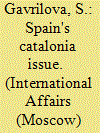

|
|
|
|
|
| Summary/Abstract |
CONTEMPORARY politics in Spain is marked by extreme instability. The country has been plagued by a string of government crises, the fragmentation of political forces, and complicated electoral processes. But it is Catalan separatism that has dominated Spain's domestic politics over the past decade. While initially a local phenomenon in the first few decades of its active existence, after Catalonia's independence referendum in 2017, Catalan separatism has indisputably become a threat to Spain's territorial integrity. It should be said that "separatism" is what politicians and scholars who champion Spain's territorial integrity call Catalonia's bid for independence; those seeking independence for the region prefer the terms "regionalism" and "nationalism."
|
|
|
|
|
|
|
|
|
|
|
|
|
|
|
|
| 10 |
ID:
074887
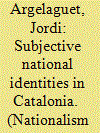

|
|
|
|
|
| Publication |
2006.
|
| Summary/Abstract |
This article relies on socio-demographic surveys to shed light on Subjective National Identity (SNI) in Catalonia, its variation between 1984 and 2001, and the social variables associated with it. While the data shows a close interrelationship between language and national identity, it also shows the increasing impact of the regional government's linguistic policy. Finally, the article explores the interconnection of SNI with the varying stances taken on the national question in Catalonia.
|
|
|
|
|
|
|
|
|
|
|
|
|
|
|
|
| 11 |
ID:
153190
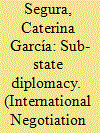

|
|
|
|
|
| Summary/Abstract |
The Spanish self-governing regions’ international actions date back as far as the 1980s. Together with the Basque Country, Catalonia is the Spanish self-governing region with the most active trajectory of international action. Catalan international action, which is a pioneer in the Spanish context, came to be slowly but progressively accepted as a normalized form of conduct by the Spanish state, as was the international action of other Spanish self-governing regions. Nevertheless, this normalization did not eliminate conflict, which continued to surface, though sporadically and without representing significant problems. However, things appear to have changed recently. Since 2012, Catalonia has been immersed in the process of independence or national transition. In this context, the Catalan Government’s international action has taken new directions and created new instruments. For the first time in the history of Catalonia’s international action, we witness clear signs of protodiplomacy.
|
|
|
|
|
|
|
|
|
|
|
|
|
|
|
|
| 12 |
ID:
167984
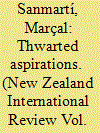

|
|
|
|
|
| Summary/Abstract |
suggests that Catalonia faces the same barriers to secession that it did at the end of the First World War.
|
|
|
|
|
|
|
|
|
|
|
|
|
|
|
|
|
|
|
|
|